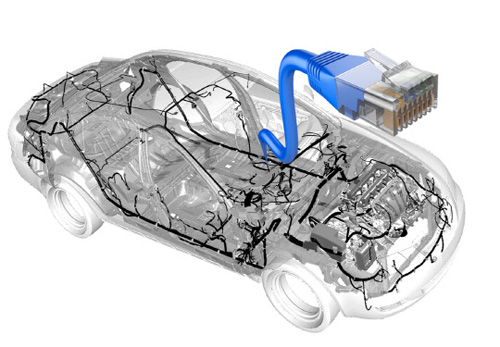Hyundai Motors-Cisco to launch a connected car with 1 giga handling per second
Kim Yong Hyuk | mj@ | 2018-01-11 11:01:14

Ethernet technology image of high-speed vehicle network. Photo by Hyundai & Kia Motors
HYUNDAI • Kia unveiled four core technologies and specifications for its in-vehicle network, which is being co-developed with network equipment company Cisco in the world`s largest consumer electronics and IT exhibition `CES 2018`
Hyundai • Kia and Cisco began collaborating on the development of connected cars in April 2016. Hyundai and Kia Motors announced that they will apply the high-speed vehicle network technology of Cisco to new cars released after 2019 through advanced technological cooperation and verification tests.
Connected cars combine information and communication technology (ICT) to enable interactive Internet and mobile services. The industry sees itself as a full-fledged step toward becoming a "fully self-propelled vehicle," which can be driven on its own without a driver.
According to market analyst IHS Markets, worldwide consolidated vehicle sales, which were 24 million units in 2015, will increase to 72.5 million units in 2023. However, it is estimated that it will take time for autonomous car growth to become visible. "The number of fully-autonomous vehicles will not reach 60,000 units by 2021," said a senior research fellow at Lee Hang-gu Industrial Research Institute. "We expect to see 33 million units sold in 2040," he said.
The announcements are expected to take the lead in the fast-growing Connected Car market. The four key points of the in-vehicle network technology are Ethernet, integrated control, high-quality network, and vehicle optimization security.
In particular, the automotive Ethernet communication technology that supports the transmission speed of 100Mbps ~ 1Gbps greatly increases the data processing capacity (125 ~ 500kbps) applied in the existing vehicle. Connected cars run in communication with other vehicles, traffic signals, traffic signs, base stations, news centers, company servers, and so on. Current vehicle network technology can not accommodate this.
The two companies also plan to apply `high-quality service` technology, which adds an integrated control function to control the information coming from each part and actively controls the transmission rate by adjusting the amount of data transmission.
In addition, a network security technology optimized for automobiles is being developed to prevent accidents caused by external abnormal hacking.
By Kim Yong Hyuk mj@
